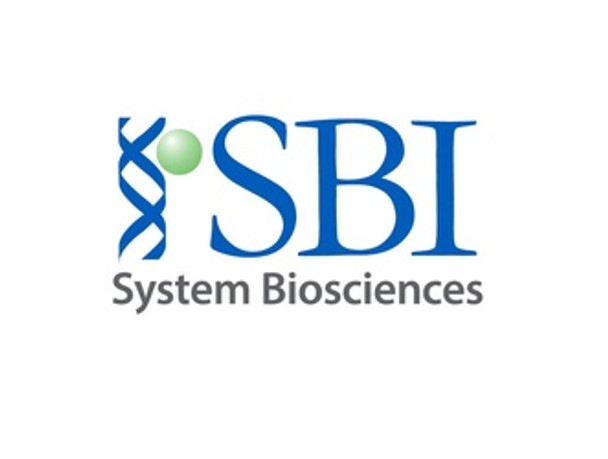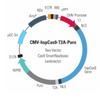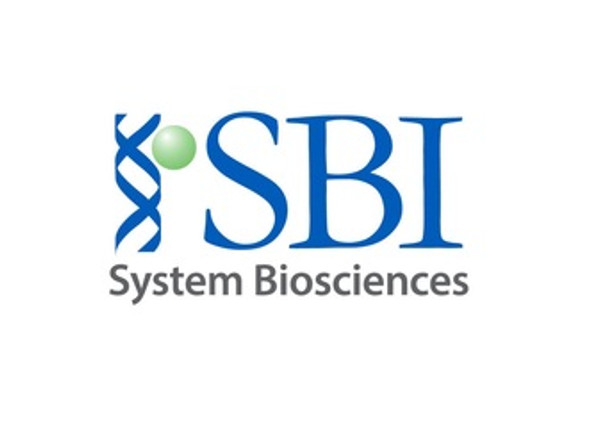System Biosciences
CMV-hspCas9-T2A-Puro SmartNuclease Lentivector Plasmid
- SKU:
- CASLV100PA-1
- Availability:
- Usually Shipped in 5 Working Days
- Size:
- 10 ug
- Shipping Temperature:
- Blue Ice/ Dry Ice
Description
CMV-hspCas9-T2A-Puro SmartNuclease Lentivector Plasmid. Cat# CASLV100PA. Supplier: SBI System Biosciences

Overview

- Conduct genome editing and engineering in difficult-to-transfect cell lines
- Drive Cas9 expression from the CMV promoter, for high expression in many commonly-used cell lines (HeLa, HEK293, HT1080)
- Perform in vivo engineering of model organisms
- Supports synthetic biology applications, gene- and cell-based therapy development, and genome-wide functional screening


How It Works
Genome engineering with CRISPR/Cas9
For general guidance on using CRISPR/Cas9 technology for genome engineering, take a look at our CRISPR/Cas9 tutorials as well as the following application notes:
CRISPR/Cas9 Gene Knock-Out Application Note (PDF) »
CRISPR/Cas9 Gene Editing Application Note (PDF) »
CRISPR/Cas9 Gene Tagging Application Note (PDF) »
CRISPR/Cas9 Basics
Through careful selection of the target sequence and design of a donor plasmid for homologous
recombination, you can achieve efficient and highly targeted genomic modification with CRISPR/Cas9.
The system
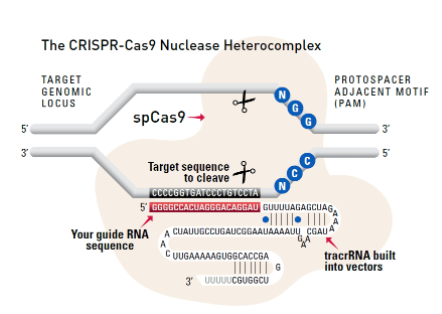
Cas9 protein—uses guide RNA (gRNA) to direct site-specific, double-strand DNA cleavage adjacent to a protospacer adapter motif (PAM) in the target DNA.
gRNA—RNA sequence that guides Cas9 to cleave a homologous region in the target genome. Efficient cleavage only where the gRNA homology is adjacent to a PAM.
PAM—protospacer adapter motif, NGG, is a target DNA sequence that spCas9 will cut upstream from if directed to by the gRNA.
The workflow at-a-glance
DESIGN: Select gRNA and HR donor plasmids. Choice of gRNA site and design of donor
plasmid determines whether the homologous recombination event results in a knock-out,
knock-in, edit, or tagging.
CONSTRUCT: Clone gRNA into all-in-one Cas9 vector. Clone 5’ and 3’ homology arms into HR
donor plasmid. If creating a knock-in, clone desired gene into HR donor.
CO-TRANSFECT or CO-INJECT: Introduce Cas9, gRNA, and HR Donors into the target cells
using co-transfection for plasmids, co-transduction for lentivirus, or co-injection for mRNAs.
SELECT/SCREEN: Select or screen for mutants and verify.
VALIDATE: Genotype or sequence putative mutants to verify single or biallelic conversion.
Supporting Data
See Two Vector Cas9 SmartNuclease Lentivectors in action
MSCV-driven Cas9 and CMV-driven Two Vector Cas9 SmartNuclease Lentivectors efficiently deliver Cas9 to transduced cells for efficient genome editing.
Two-Vector Cas9-Lentiviruses efficiently knockout stable RFP reporter gene
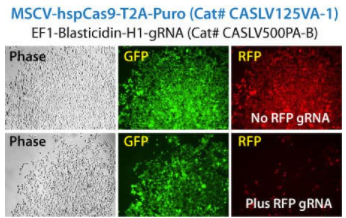
Figure 1. Two Vector Cas9 Lentiviruses efficiently knockout stable RFP reporter gene. METHODS: Phase and fluorescent images of modified HEK293T cells stably expressing RFP and GFP (top panels), which have been co-infected (MOI = 3) with the MSCV-Cas9-T2A-Puro Two Vector Cas9 SmartNuclease Lentivector (Cat.# CASLV125VA-1) and a gRNA virus expressing a guide RNA targeting RFP (EF1α-Blasticidin-H1-RFP gRNA, Cat.# CASLV500PA-B; bottom panels). Images of cells were taken 11 days after placing the cells under selection, and show ablation of RFP expression in target cells infected with both the Cas9-expressing Lentivector and gRNA-expressing Lentivector (bottom panels).
Transduce Cancer Cell Lines with Cas9-Lentivirus
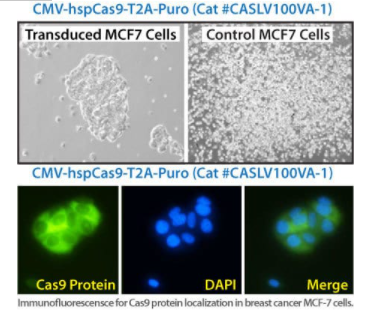
Figure 2. Transduce Cancer Cell Lines with Cas9-Lentivirus. METHODS: (Top panels) Phase microscopy image of MCF-7 breast cancer cells infected with pseudoviral particles of CMV-hspCas9-T2A-Puro (Cat #CASLV100VA-1) and selected with Puromycin (1 µg/ml) for 10 days in culture, show distinct colony formation. (Bottom panels) Immunofluorescence staining of Cas9 protein expression in MCF-7 cell lines stably transduced with the CMV-hspCas9-T2A-Puro Two Vector Cas9 SmartNuclease Lentivector (Cat #CASLV100VA-1), show punctuate nuclear and perinuclear staining indicative of strong Cas9 protein expression in the nucleus.


